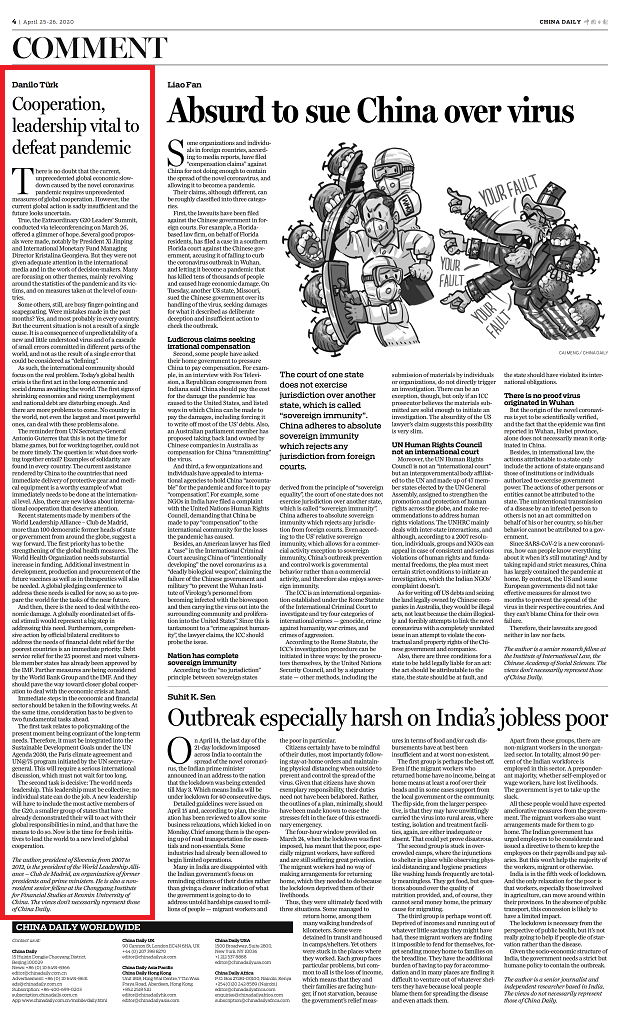Major Power Relations
Your Present Location: PROGRAMS> Major Power RelationsDanilo Türk: Cooperation, leadership vital to defeat pandemic
By: Danilo Türk Source: China Daily Updated: 2020-04-25
There is no doubt that the current, unprecedented global economic slowdown caused by the novel coronavirus pandemic requires unprecedented measures of global cooperation. However, the current global action is sadly insufficient and the future looks uncertain.
True, the Extraordinary G20 Leaders' Summit, conducted via teleconferencing on March 26, offered a glimmer of hope. Several good proposals were made, notably by President Xi Jinping and International Monetary Fund Managing Director Kristalina Georgieva. But they were not given adequate attention in the international media and in the work of decision-makers. Many are focusing on other themes, mainly revolving around the statistics of the pandemic and its victims, and on measures taken at the level of countries.
Some others, still, are busy finger-pointing and scapegoating. Were mistakes made in the past months? Yes, and most probably in every country. But the current situation is not a result of a single cause. It is a consequence of unpredictability of a new and little understood virus and of a cascade of small errors committed in different parts of the world, and not as the result of a single error that could be considered as "defining".
As such, the international community should focus on the real problem. Today's global health crisis is the first act in the long economic and social drama awaiting the world. The first signs of shrinking economies and rising unemployment and national debt are disturbing enough. And there are more problems to come. No country in the world, not even the largest and most powerful ones, can deal with these problems alone.
The reminder from UN Secretary-General Antonio Guterres that this is not the time for blame games, but for working together, could not be more timely. The question is: what does working together entail? Examples of solidarity are found in every country. The current assistance rendered by China to the countries that need immediate delivery of protective gear and medical equipment is a worthy example of what immediately needs to be done at the international level. Also, there are new ideas about international cooperation that deserve attention.

Recent statements made by members of the World Leadership Alliance-Club de Madrid, more than 100 democratic former heads of state or government from around the globe, suggest a way forward. The first priority has to be the strengthening of the global health measures. The World Health Organization needs substantial increase in funding. Additional investment in development, production and procurement of the future vaccines as well as in therapeutics will also be needed. A global pledging conference to address these needs is called for now, so as to prepare the world for the tasks of the near future.
And then, there is the need to deal with the economic damage. A globally coordinated set of fiscal stimuli would represent a big step in addressing this need. Furthermore, comprehensive action by official bilateral creditors to address the needs of financial debt relief for the poorest countries is an immediate priority. Debt service relief for the 25 poorest and most vulnerable member states has already been approved by the IMF. Further measures are being considered by the World Bank Group and the IMF. And they should pave the way toward closer global cooperation to deal with the economic crisis at hand.
Immediate steps in the economic and financial sector should be taken in the following weeks. At the same time, consideration has to be given to two fundamental tasks ahead.
The first task relates to policymaking of the present moment being cognizant of the long-term needs. Therefore, it must be integrated into the Sustainable Development Goals under the UN Agenda 2030, the Paris climate agreement and UN@75 program initiated by the UN secretary-general. This will require a serious international discussion, which must not wait for too long.
The second task is decisive: The world needs leadership. This leadership must be collective; no individual state can do the job. A new leadership will have to include the most active members of the G20, a smaller group of states that have already demonstrated their will to act with their global responsibilities in mind, and that have the means to do so. Now is the time for fresh initiatives to lead the world to a new level of global cooperation.
The author, president of Slovenia from 2007 to 2012, is the president of the World Leadership Alliance-Club de Madrid, an organization of former presidents and prime ministers. He is also a nonresident senior fellow at the Chongyang Institute for Financial Studies at Renmin University of China.























































































 京公网安备 11010802037854号
京公网安备 11010802037854号





